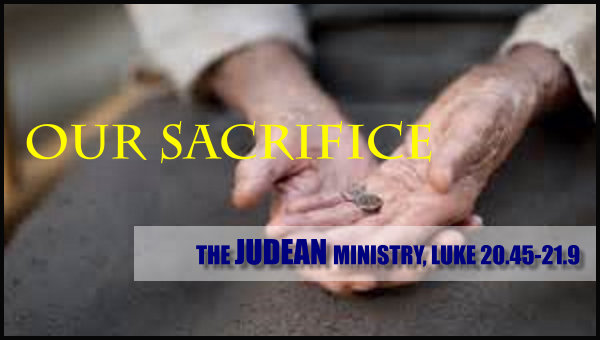By Tyson Thorne

The Judean Ministry at Various Cities (18.1-24.53), 20.45-21.9
Immediately after toying with the Sadducees, while everyone was still listening to him, Jesus turned to his disciples and warned them against becoming hypocrites like the religious leaders. The Pharisees and their ilk may behave outwardly as devout men of God, but inwardly are devoted only to their own fame and fortune. It has been my experience that the more theatrical one is about their devotion, the darker the sins they are hiding. A good lesson for all church leaders to learn. An even better one is that such pretenders will be more severely punished.
Jesus didn’t have to look very far for an illustration of his point. Seeing his fellow countrymen enter the temple to make their offerings he called the disciples attention to how and what was given. The rich deposited their freewill offering into the receptacle, and the weight and number of their coins would have made a noticeable sound. It would have been obvious to anyone nearby that the offering was one of considerable value. What no one noticed was the widow dropping in her few cents, the coins small and nearly weightless making only a tiny plink as they hit the other coins.
As we saw in the Parable of the Minas, Jesus doesn’t consider economic equality to be an issue. In this instance, rather than looking at the amount of the gift, he evaluated the quantity of the gift based on a percentage of what one had. On such a scale, the widow’s offering far surpassed that of the wealthy. Once again, we see that in God’s economy it doesn’t matter if one is rich or poor, but rather how one uses what they have. The widow, who gave most what she had to live on (though it was only worth a few cents) lived by greater faith than those who gave but a fraction of what they had (though it was worth a great deal more).
This should be of great interest to all who are inclined toward political or economic discussion, or to the plight of the poor. If economic equality were important, God could certainly secure such an outcome among humanity. The truth is, economic prosperity is rarely an indication of what matters most, spiritual affluence. The people of Jesus’ day assumed material wealth was an indication of spiritual fortune, a concept Jesus stated was misguided on many occasions. Yet we must be careful to not make the opposite mistake and assume that poverty is an indication of a righteous spiritual condition either. Wealth, or the absence of it, is no better indicator of a person’s spiritual condition than the color of one’s skin, or beauty, or physical strength or even education.
The lesson about the Windows Offering was Jesus’ last on this occasion. His antagonism toward the religious leaders would do him no favors, but Luke moves onward to another day (21.5). They were again at or near the temple and the conversation was how beautifully the structure was adorned. Jesus, prophet that he is, mentioned that a time was coming when the temple would be utterly destroyed, not a single stone being left atop another. Most Bible’s inappropriately title this section “Signs of the End of the Age”, but Jesus is not speaking of the time of his return (at least not directly). Instead the events he discusses will take place only a few decades later. Due to a revolt among the Jews, the Romans will invade Jerusalem and level the temple.
This raises an interesting question, if one stone was not left upon another then what are we to say about the Wailing Wall in Jerusalem? Only that it cannot be a wall of the temple. This is not the place to try and prove that assertion, but if interested please see Bob Cornuke’s book Temple. It would be a time of judgment for the nation of Israel, and may parallel the events of the final days as well. Either way, when judgment comes by way of human intervention through wars or rebellions, whatever we may lose or sacrifice, we are not to fear. Our only respect is to be given to God, the savior of our souls.
|
|